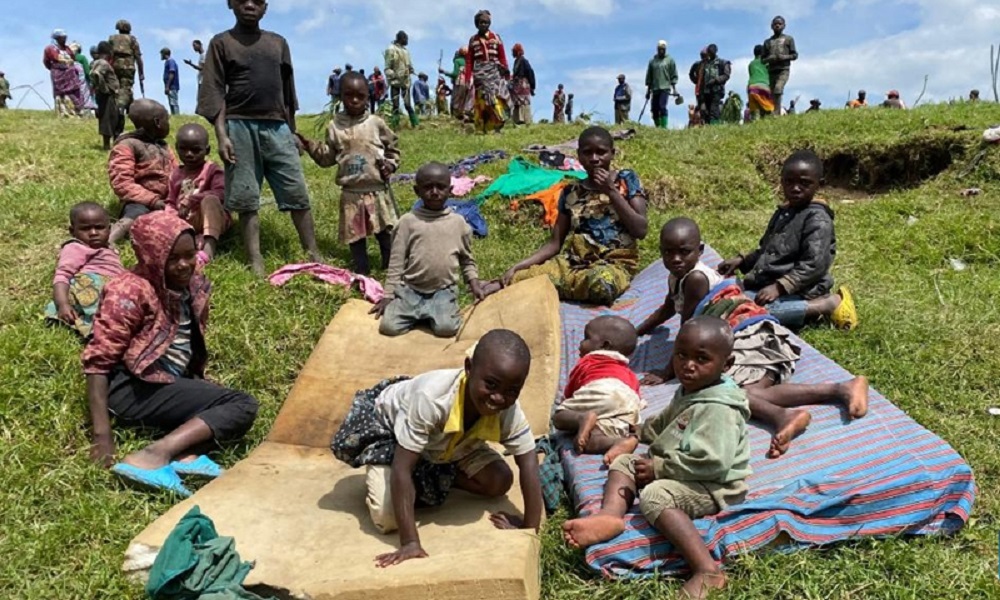
This photo taken on April 20, 2023 shows people in Kilolirwe, North Kivu province, the Democratic Republic of the Congo (DRC). As the March 23 Movement (M23) rebels have been withdrawing from occupied villages and towns in the eastern Democratic Republic of the Congo (DRC), Jeff Nyagah, commander of the Regional Force formed by the East African Community (EAC), says he is pleased with the positive progress in the withdrawal process.(Photo: Xinhua)
In 2022, EAC member countries established a regional force to end the activism of armed groups in eastern DRC, including the M23 rebels.
According to Jeff Nyagah, these withdrawals followed the deployment of several contingents of the EAC Regional Force who took control after the rebels agreed to leave their positions in accordance with the roadmaps agreed to by the regional heads of state.
In the Rutshuru territory, about 100 km from Goma, the capital of North Kivu province, Ugandan troops under the mission of the EAC Regional Force had since late March taken over Bunagana, a strategic town bordering Uganda that was formerly occupied by the M23.
The fall of multiple localities to the hands of the rebels increased the economic pressure on the population of Goma and its surroundings, as main roads in the region have been interrupted, causing a shortage of food and basic necessities.

“We have so far achieved a ceasefire and the withdrawal of the (M23) rebels. For us, this is an achievement which shows that we are on the right track of restoring peace and the return of the population to their homes,” said General Nyagah. “We welcome this first step.”
During a press conference last week in Kinshasa, the capital of the DRC, Congolese President Felix Tshisekedi reaffirmed his country’s position not to open dialogue with the M23 rebels. Bertrand Bisimwa, head of the political wing of the M23, also rejected the cantonment of his elements without a direct dialogue with Kinshasa.
Jeff Nyagah, however, is reassuring that the progress of the peace process on the ground remains positive and would lead to a definitive resolution to this crisis, in particular the continuation of talks with the M23 rebels at the regional level.
To reassure that life returns to normal in the region, troops of the EAC Regional Force deployed on the Goma-Bunagana road section, a principal lifeline for local residents, are currently working to secure the traffic of small traders who supply the city of Goma with food products, observed Xinhua on the ground.
“We were leaving the city of Goma to come and supply ourselves here in the town of Kibumba with food products. For the moment, the situation is improving every day and we hope that it will go until the total circulation of the road so that our economic situation gets improves,” said Jeannette Ndangire, a trader from Goma found in Kibumba.

While traffic is timidly resuming on the main roads in the region after the withdrawal of the M23 from certain localities, many residents interviewed in the area deplore the harassment of unidentified militia carrying weapons, threatening local security.
For the EAC Regional Force, these are local armed groups that must be eradicated by all means in order to allow free movement in the areas liberated by the rebels.
“Now that the M23 is no longer there and poses no danger, there is no reason for local groups to continue to carry arms and bother the population. It must stop immediately,” insisted Jeff Nyagah during his address to the population of Kilolirwe in the territory of Masisi, recently liberated by the EAC Regional Force.

Several people interviewed in the camp for displaced people in Kilolirwe also pointed to local armed groups that still sow terror on the roads that connect their homes and the city of Goma.
Since the beginning of the deployments of the EAC Regional Force, four countries have already sent troops on the ground in the DRC, namely Uganda, Kenya, Burundi and South Sudan, thus covering all the localities that used to be occupied by M23 rebels who now withdrew to regroup in the village of Sabinyo, located near Bunagana, at the border with Uganda.
According to data from the UN Office for the Coordination of Humanitarian Affairs (OCHA) in early March 2023, more than 20,000 people have been displaced due to recent fighting in the eastern DRC. In the past year, more than 800,000 people have been affected by renewed fighting between Congolese forces and the M23 rebels.
Subscribe to view notification of our daily news
RwandaPodium © All Rights Reserved. Powered by thesublime.rw